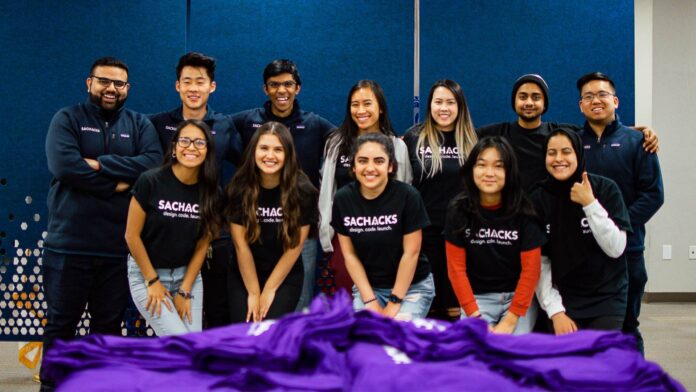Lovelace Hacks, organized by SacHacks, offers a chance for women and gender minorities to explore the worlds of computer science and design
Lovelace Hacks, the first women-focused hackathon hosted by UC Davis, took place virtually on the weekend of April 23–25 in an effort to promote gender diversity in the traditionally male-dominated field of computer science. The competition, led by the organization SacHacks, offered both beginner and experienced programmers and designers a chance to learn new skills.
SacHacks was founded in 2018 at UC Davis and currently hosts a variety of hackathon events each year. This particular event is named after Ada Lovelace, who has been called the first computer programmer, in line with one of the event’s goals of recognizing female contributions to the tech industry.
Derek Lee, the executive director of SacHacks, graduated from UC Davis in fall of 2020 with a degree in computer engineering. Lee explained the general schedule of a weekend competition like Lovelace Hacks.
“During hackathons, students will assemble into teams and use data and technology from different sponsors to develop solutions and projects to be judged from industry professionals and UC Davis faculty,” Lee said via email. “Throughout the event, there will be keynote speakers, technical and non-technical workshops and fun activities.”
According to Jen Jeon, a fourth-year cognitive science and design double major, a designer at SacHacks and the president of Davis Women in Computer Science (WiCS), coding is not the only aspect of hackathons, but design also plays a huge part in the success of tech projects.
“In terms of hackathons, designing and coding come together in that design works to serve as a roadmap to how the project will look and feel,” Jeon said via email. “That design is then implemented with code.”
Joen said that planning Lovelace Hacks was a collaborative process, with the WiCS board also taking large part.
“[WiCS] seeks to empower and build community among women pursuing computer science specifically, but also the technology industries broadly as well,” she said. “The WiCS board worked in conjunction with SacHacks to market and plan the event to ensure that it is an event that is inclusive and welcoming, as well as educational and community-building.”
Lee elaborated on the goal of inclusivity.
“Lovelace Hacks exists to provide those who identify as women and gender minorities the awareness and opportunity to explore technology, regardless of skill level and background,” Lee said. “By fostering the importance of women in computer science and STEM, we hope to get more individuals to try computer science, demonstrate that women and gender minorities can thrive in this male-dominated field and bring awareness to all the women that built the tech industry.”
Lee highlighted keynote speaker Sadie St. Lawrence, the founder and CEO of Women in Data.
“I have been in touch with Sadie St. Lawrence for many years as I have tried to have her be a guest speaker for the SacHacks events as she is from Sacramento,” Lee said. “Thankfully, she was finally free the weekend of Lovelace Hacks to be our keynote speaker. As the founder and CEO of Women in Data, she is a very inspirational person for the tech community.”
Mary Bangloy, a second-year statistics and communication double major who holds leadership positions at both SacHacks and the UC Davis branch of Women in Data, described the importance of female-focused hackathons.
“We currently live in a world where women and gender minorities don’t feel as welcomed in tech careers,” Bangloy said via email. “Through hackathons like Lovelace Hacks, women and gender minorities can embrace the energy and ideas they bring into the world of technology.”
Lee detailed how Lovelace Hacks came about, explaining that although the idea of female-focused hackathons is not new, it is new to UC Davis.
“I always thought UC Davis had enough opportunity for students to participate in hackathons and that this type of event did not need to exist in UC Davis,” Lee said. “However, in my last quarter of college at UC Davis, I took ECS 188 […]. In that class, professor Patrice Koehl had a lecture dedicated to women in technology and sparked a lot of discussion about what it is like to be non-male in technology.”
According to Lee, listening to his classmates talk about their experiences in the tech industry made him realize that an event like Lovelace Hacks might need to exist, and after the lecture, he had a one-on-one with Koehl to discuss the idea further. Following his graduation in fall of 2020, Lee worked with WiCS to create the initial plans before training Davis students to organize the event as part of SacHacks’ expanding organization team.
Any undergraduate student or graduate student over the age of 18 who identifies as a woman or gender minority was welcome to sign up for free to hack or even just attend workshops. Lee also encouraged allies to participate as mentors.
Jeon encouraged people to try participating in a hackathon, especially beginners.
“Even if you have no experience in technology at all or [are] scared of the prospects, hackathons are a perfect place to learn more,” Jeon said.
Lee said that this goal of inclusion for new programmers and designers was a success, detailing that 63% of UC Davis students who submitted a project to Lovelace Hacks were first-time hackathon participants.
“[This] shows to me that we succeeded in supporting our Lovelace Hacks Three Core Values of Awareness, Thrive, and Exposure,” Lee said. “This amazing statistic would not have been possible without UC Davis Engineering Alumna Tran Nguyen sponsoring the event. Her insights on how isolating it feels when you’re a minority for the duration of your career gave us the guidance on how to empower and inspire in this important and progressive initiative for women and gender minorities in tech.”
Written by: Sonora Slater —science@theaggie.org






